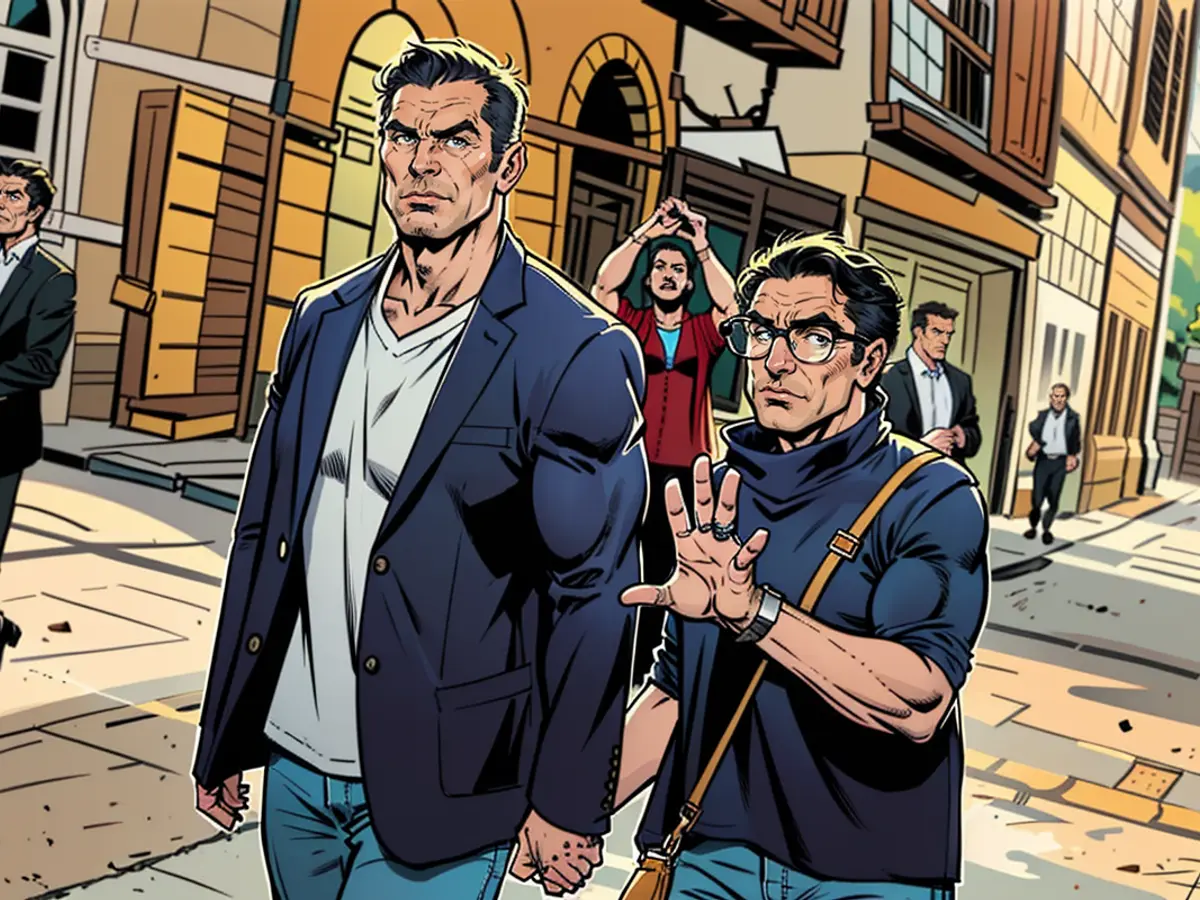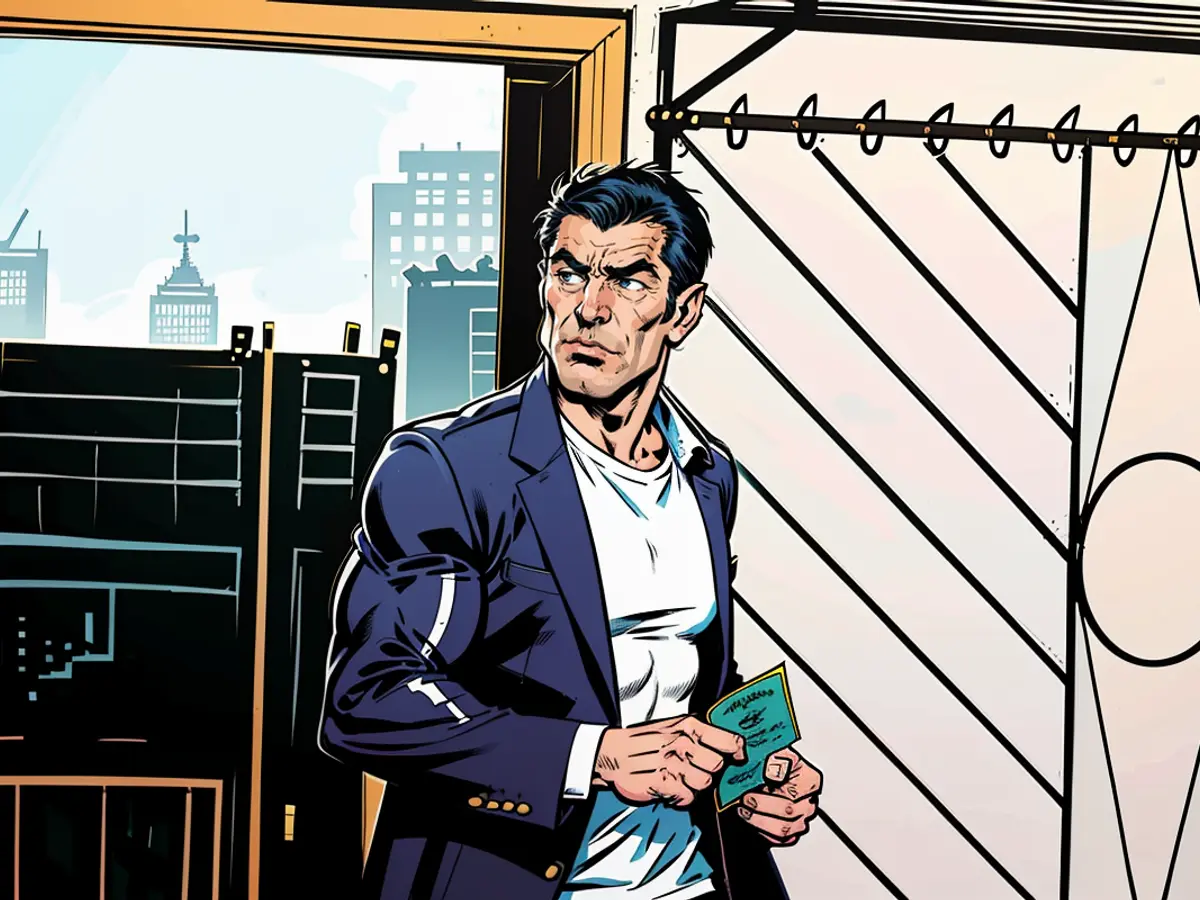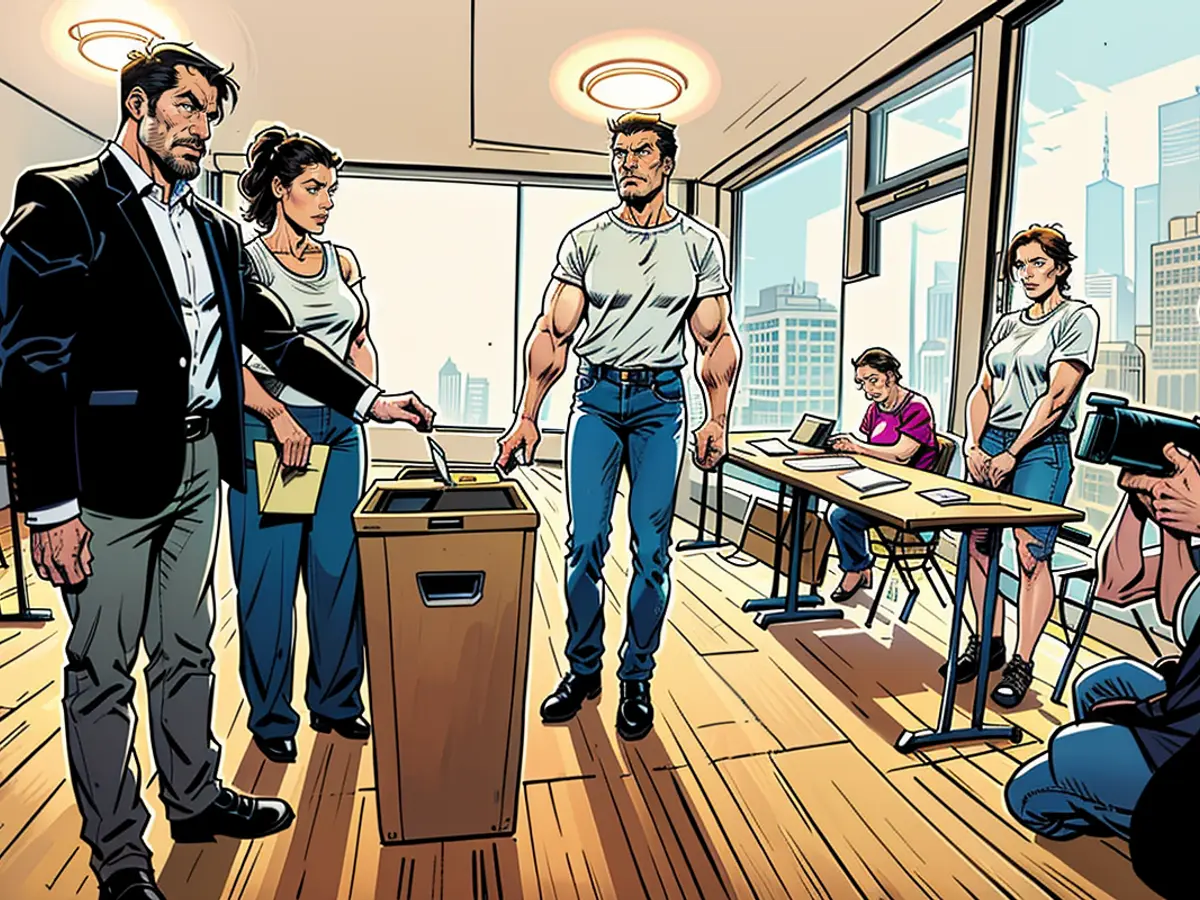At 15:52, Hook heads to the voting booths, accompanied by Ramelow and his spouse.
Thuringia's AfD state leader and top election candidate, Björn Höcke, cast his ballot at midday. The 52-year-old arrived at his voting station in a Lada Niva, a Russian-made off-road vehicle. Höcke voted in Bornhagen, located in the Eichsfeld district.
Thuringia's Minister President Bodo Ramelow voted in the state capital of Erfurt. The 68-year-old cast his vote alongside his wife, Germana Alberti vom Hofe. He's served as the state head of government, with a brief interruption, since 2014, currently leading a minority coalition.
15:40 Voter Turnout Surpasses Previous Election Levels
In Thuringia, 44.4% of voters had cast their votes by 2:00 PM. This represents an increase of more than two points compared to the previous election five years ago. High voter turnout is anticipated to continue. Absentee voters have not been accounted for yet, according to the state election commissioner. In Saxony, the turnout was 35.4% by early afternoon, slightly higher than in 2019. However, the election commissioner anticipates a significant increase in absentee voters compared to 2019. Polling stations in both states will close at 6:00 PM.
15:13 "Kretschmer Anticipates Traffic Light Parties' Entry into the State Parliament"
14:40 Key Issues for Saxony and Thuringia
A large survey reveals that about one-third of voters in Saxony and Thuringia plan to vote for the AfD in the upcoming September 1st elections. The survey sheds light on the primary concerns and problems. Migration is merely one of them.
14:13 Höcke Leaves Polling Station promptly

At Thuringia's state election, AfD's top candidate, Björn Höcke, cast his vote around midday. After voting, Höcke didn't remain at the Bornhagen polling station and declined to speak with journalists on site. Due to perpetual losses to the CDU candidate in his Eichsfeld district home, Höcke switched to the Greiz constituency. However, he faced a probable defeat against the CDU there.
13:50 Voter Turnout in Thuringia Approximates 2019 Levels
In Thuringia, the voter turnout mirrors the previous parliamentary election. According to the state election commissioner, around 32% of eligible voters had cast their ballots at polling stations by noon. Absentee voters are excluded from these statistics. In 2019, the voter turnout was 31.2% at noon. There appears to be more interest in the state election than in the European and local elections earlier this year. That year's voter turnout was 24.3% at the same time.
13:29 High Voter Turnout Expected in Saxony
In Saxony, high voter turnout is expected for the state election. By midday, 25.8% of eligible voters had cast their ballots, the Statistical State Office in Kamenz reported. In 2019, the figure was 26.2% at the same time. Absentee voters have not been included in the preliminary figures yet. It is estimated that 24.6% of eligible voters will vote by mail. In 2019, this figure was 16.9%. According to the state election commission, the elections are running smoothly in the morning without any disruptions.
13:11 Von Lucke: Election Result Could Slow Down Berlin Coalition
Although the state election results in Saxony and Thuringia have yet to be determined, political scientist Albrecht von Lucke indicated in an ntv interview that if the SPD doesn't secure entry into the state parliament, it would almost be "an earthquake." He evaluated the election and its potential consequences.

12:44 Police Investigate Threat at Polling Station
Following an incident at a polling station in Gera, the police are investigating a threat. A man donning an AfD T-shirt entered the polling station earlier that morning, according to a police spokesperson. The polling station manager then asked the man to remove the shirt since party advertising was prohibited within the polling station. The man complied, but he threatened to returns dissatisfied with his treatment while leaving the polling station grounds. The police filed a report and cautioned the man. Additionally, the police in Erfurt are investigating some political graffiti ("Höcke is a Nazi") near polling stations as a case of criminal damage.
12:15 Correctiv Warns of Circulating False Information
The research network Correctiv has issued a warning about an old misleading report that is resurfacing again. It claims that signing the ballot protects against election fraud. However, the Federal Returning Officer's office informed Correctiv, "The ballot may not be signed. Signing the ballot by the voter risks compromising the ballot's secrecy, which renders the entire ballot invalid."
11:25 Sonneberg Experiences Exponential Surge in Extremist ActionsSonneberg becomes the initial district in Germany to be governed by an AfD politician. However, zealous residents express concerns about being aggressively harassed, leading several to abandon their professions. Moreover, reports suggest an exponential increase of 5 times in extremist attacks over the past year. Specialists attribute this surge to the AfD district administrator.
10:57 Kretschmer Addresses Voting StationSaxony's Prime Minister Michael Kretschmer dubs the state parliamentary election as "most likely the most significant election in 34 years." At his vote in Dresden, he expresses gratitude towards numerous individuals who "voted differently" earlier but have recently opted for the "strong conservative alliance," namely the Saxon Union. "This cooperation will allow us to establish a government that serves this region," Kretschmer adds. As per recent polls, his CDU shares a close race with the AfD.
10:30 Ramelow: Wagenknecht "Is Not on the Ballot"For Thuringia's Prime Minister Bodo Ramelow, Election Day represents a "celebration of democracy" – even if he may not secure re-election. During an interview with ntv, the Left Party politician clarifies his reasoning against favoring a minority government and expressions of doubt towards the BSW.

09:59 "Distaste for History": Historian Criticizes Election DateHistorian Peter Oliver Loew expresses his disapproval towards scheduling the state elections in Saxony and Thuringia on the 85th anniversary of the German invasion of Poland in 1939. "Those who thought it was a good idea to arrange elections on the 1st of September had a distaste for history," the German Polish Institute director tells the editorial network Germany (RND). As for the AfD, classified as "securely right-wing extremist" by the domestic intelligence services in both states, Loew concludes, "This could give rise to highly discomforting correlations, especially if a party with shady links to the Nazi era emerges victorious in Dresden and Erfurt."
09:30 "Critical Election": Comprehensive Data on Saxony's State ElectionApproximately 3.3 million eligible voters in Saxony have the chance today to determine who will dictate the state's political course in the future. The CDU may lose its means of being the dominant power in the state for the first time since 1990. Saxony's Prime Minister Michael Kretschmer describes it as a "critical election." "This is about everything."
09:05 Kretschmer Alleges "Panicked Activity near Election"Election Day has arrived in Saxony, and the inquiry is: Will Prime Minister Michael Kretschmer maintain the CDU's winning streak in the state? During an ntv interview, he discusses his stance on the refugee debate, the traffic light coalition, and the Ukraine war.
08:46 Election Data for ThuringiaDecision time has arrived: In the heart of Germany, the candidate for governance of the federal state with around 2.1 million inhabitants for the next five years will be chosen. Will the AfD with lead candidate Björn Höcke secure the leading position in Thuringia?
08:24 Potential Threat to Democracy: How the AfD Could Undermine Democratic InstitutionsPolls indicate that the AfD is likely to significantly extend its influence in the upcoming elections in Saxony and Thuringia. For democratic institutions, this is concerning, as a research group has highlighted. Because the rule of law is not as robust as many believe it to be.
08:00 Voting Stations Open in Thuringia and SaxonyToday marks the creation of new state parliaments in Thuringia and Saxony. In the polls, the AfD holds a commanding position in Thuringia. In Saxony, the CDU of incumbent head Michael Kretschmer and the AfD are neck and neck. The first projections are expected around 6 pm when the polling stations close. The elections in the two eastern German states serve as a gauge for the traffic light coalition in Berlin.
For the present red-red-green coalition in Thuringia led by Prime Minister Bodo Ramelow (Left), there is no majority in the polls. A coalition consisting of the CDU, the Bündnis Sahra Wagenknecht (BSW), and the SPD is considered a potential post-election alliance. In Saxony, it remains unclear whether the current coalition of CDU, SPD, and Greens will retain its majority. Kretschmer does not dismiss the possibility of joining forces with the BSW. The Left faces the threat of being ousted from the parliament in Saxony. The same fate may befall the Greens and FDP in Thuringia.

14:13 After Voting, Höcke Departs Election Station SilentlyFollowing his midday vote at the Bornhagen polling station, Thuringia's AfD state leader and top election candidate, Björn Höcke, chose not to engage with journalists present at the site.
14:40 AfD's Popularity in Saxony and Thuringia: Key Concerns RevealedDespite migration being one of the primary concerns among voters planning to support the AfD in Saxony and Thuringia, the party's strong showing in the upcoming September 1st elections suggests a multitude of issues and problems resonating with the electorate.








